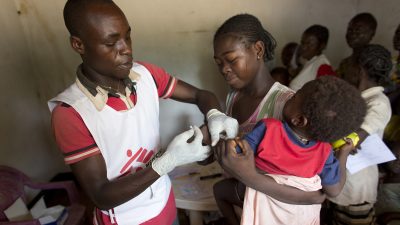By
Peter Louis
Ministerial Conference on Immunisation in Africa presses countries to do more, but gives free pass to pharmaceutical companies charging inflated vaccine prices.
As the first-ever Ministerial-level meeting on immunisation in Africa gets underway, the international medical humanitarian organisation Médecins Sans Frontières/Doctors Without Borders (MSF) expressed dismay that the serious issue of skyrocketing vaccine prices available in adequate supply was not on the agenda, despite being one of the key barriers to protecting more children against killer diseases.
“In our projects, MSF has struggled to introduce new vaccines due to their high price. We’re frustrated that we’re unable to provide some of the most critical vaccines to our patients because they remain priced out of reach, or not available in needed supply, and we hear the same frustration from governments consistently repeated in various global discussions,” said Dr Myriam Henkens, International Medical Coordinator at MSF. “If vaccine prices continue to spiral out of control, we will continue to see countries in Africa and around the world faced with difficult decisions about which deadly diseases they can and can’t afford to protect their children against. Ministers at this conference literally can’t afford to waste this opportunity to again speak out against high prices and push for change.”
Last year, MSF released its vaccine pricing report, The Right Shot: Bringing Down Barriers to Affordable and Adapted Vaccines, which showed that in most African countries, with the addition of new vaccines, it is now 68 times more expensive to vaccinate a child than in 2001. In the near future, many parts of the continent may not be able to afford new high-priced vaccines like that against pneumonia. For example, after losing its donor support from Gavi, the Vaccine Alliance, Angola will be faced with a 1,523% increase for its vaccines bill over the next few years, while Congo Brazzaville will face an increase of 801%. Other African countries that do not benefit from donor support, and do not have access to lower prices negotiated by Gavi, are facing dramatically higher immunisation bills.
In May 2015, 193 governments met in Geneva for the annual World Health Assembly, where they unanimously passed a landmark resolution demanding more affordable vaccines in adequate supply and increased transparency around vaccine prices. The governments of 23 African countries underlined the rising inequities among them caused by the increased financial burden of new vaccines, and nine of those countries – Algeria, Egypt, Libya, Morocco, Nigeria, Sudan, Togo, Tunisia, and Zimbabwe – co-sponsored the resolution, the highest number from any continent.
“After governments made clear they want solutions to sky-high vaccine prices, we were expecting the issue to feature prominently at this conference,” said Kate Elder, Vaccines Policy Adviser at MSF’s Access Campaign. “We hear that governments – who are already strapped with multiple challenges – are instead being asked to put more resources into buying expensive vaccines, but without anyone telling the pharmaceutical giants to drop their prices. Both better resourcing but also, critically, lower prices are needed.”
The pneumonia vaccine is the world’s best-selling vaccine, and accounts for almost half the price of vaccinating a child in the poorest African nations that get Gavi support. To date, the two producers of the vaccine, Pfizer and GlaxoSmithKline (GSK), have made more than $30 billion in sales from the pneumonia vaccine, but still refuse to lower the price in developing countries. After years of fruitless negotiations with the companies to lower the vaccine’s price for use in its projects, MSF is calling on the public to help put pressure on the companies to reduce the price of this vaccine to US$5 per child (for all three doses) in all developing countries and for humanitarian organisations. Pneumonia is the leading global cause of childhood death and kills nearly one million children each year.
“As doctors who have watched far too many children die of pneumonia, we’re not going to back down until we know that all countries can afford the vaccine and that it will be available,” said Dr Henkens. “Today we want to see governments’ concerns heard and steps taken to push pharmaceutical companies to drop the price of the pneumonia and other life-saving vaccines.”



pharmaceutical companies are not for helping people but profit this is what of pharmaceutical CEO has recently said in his statement. besides capitalist world leaders also always confusing the matters at great level and basic intention behind such confusion is same what may call it ''profit'' through different means and ways.